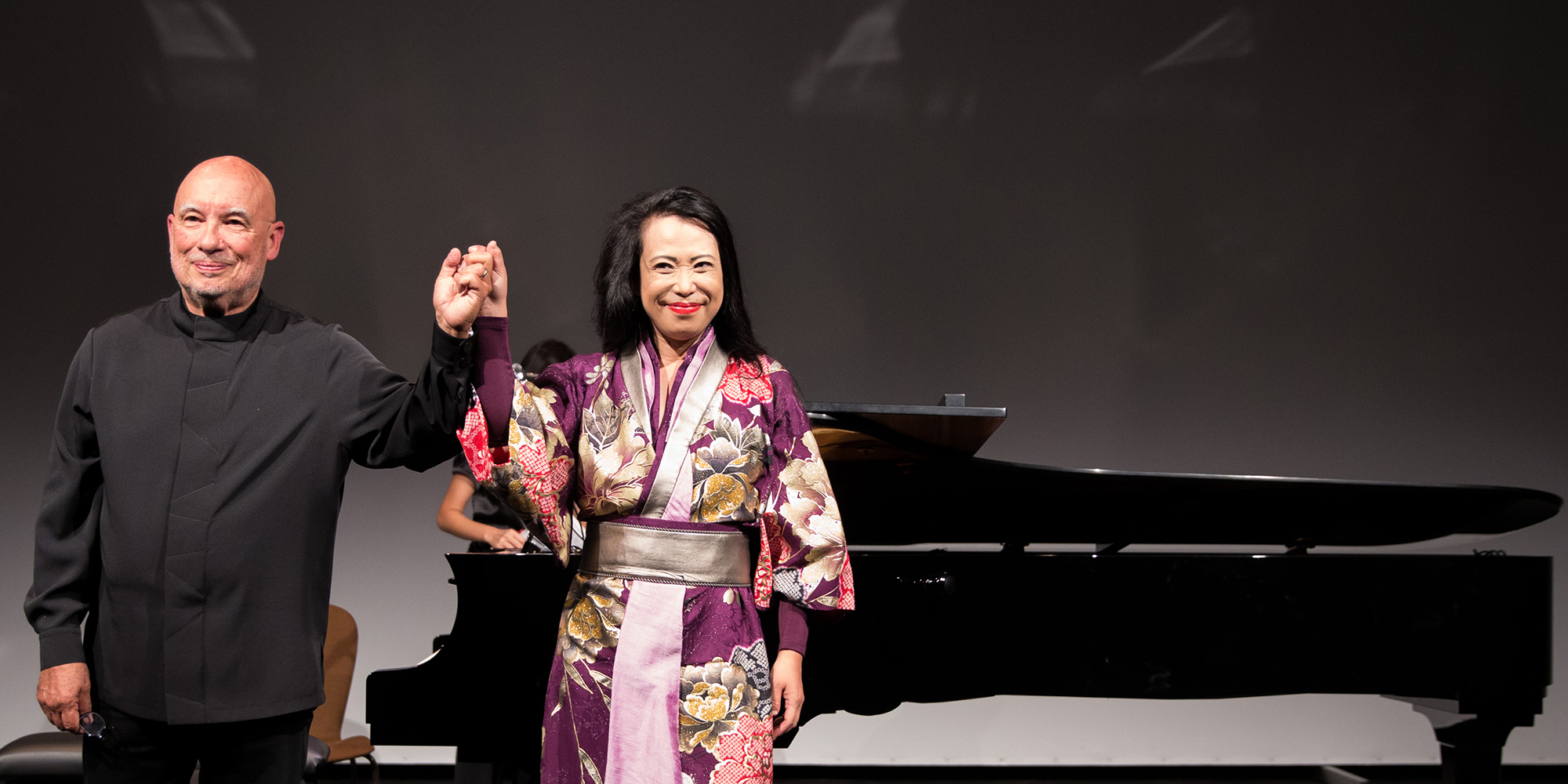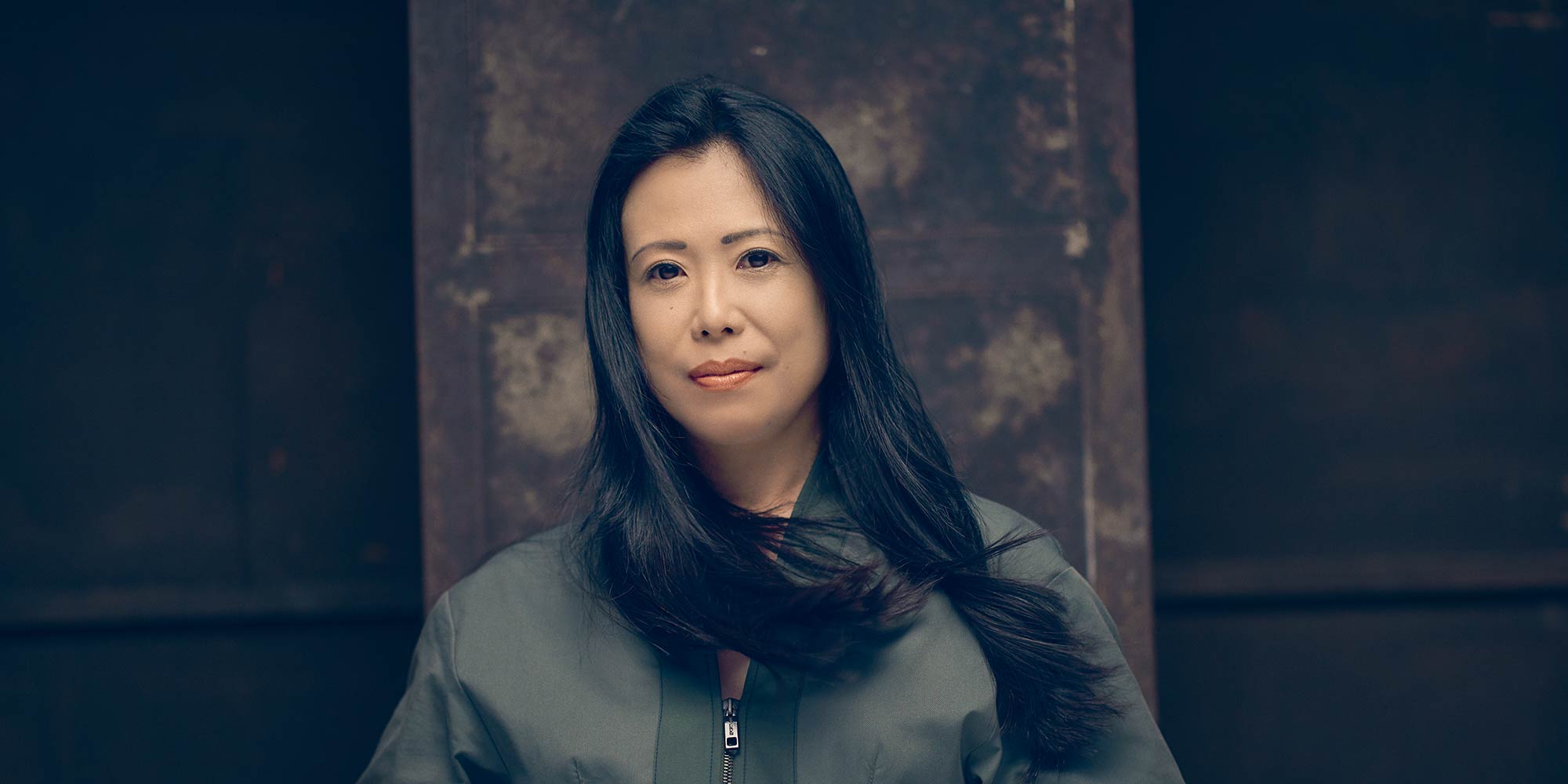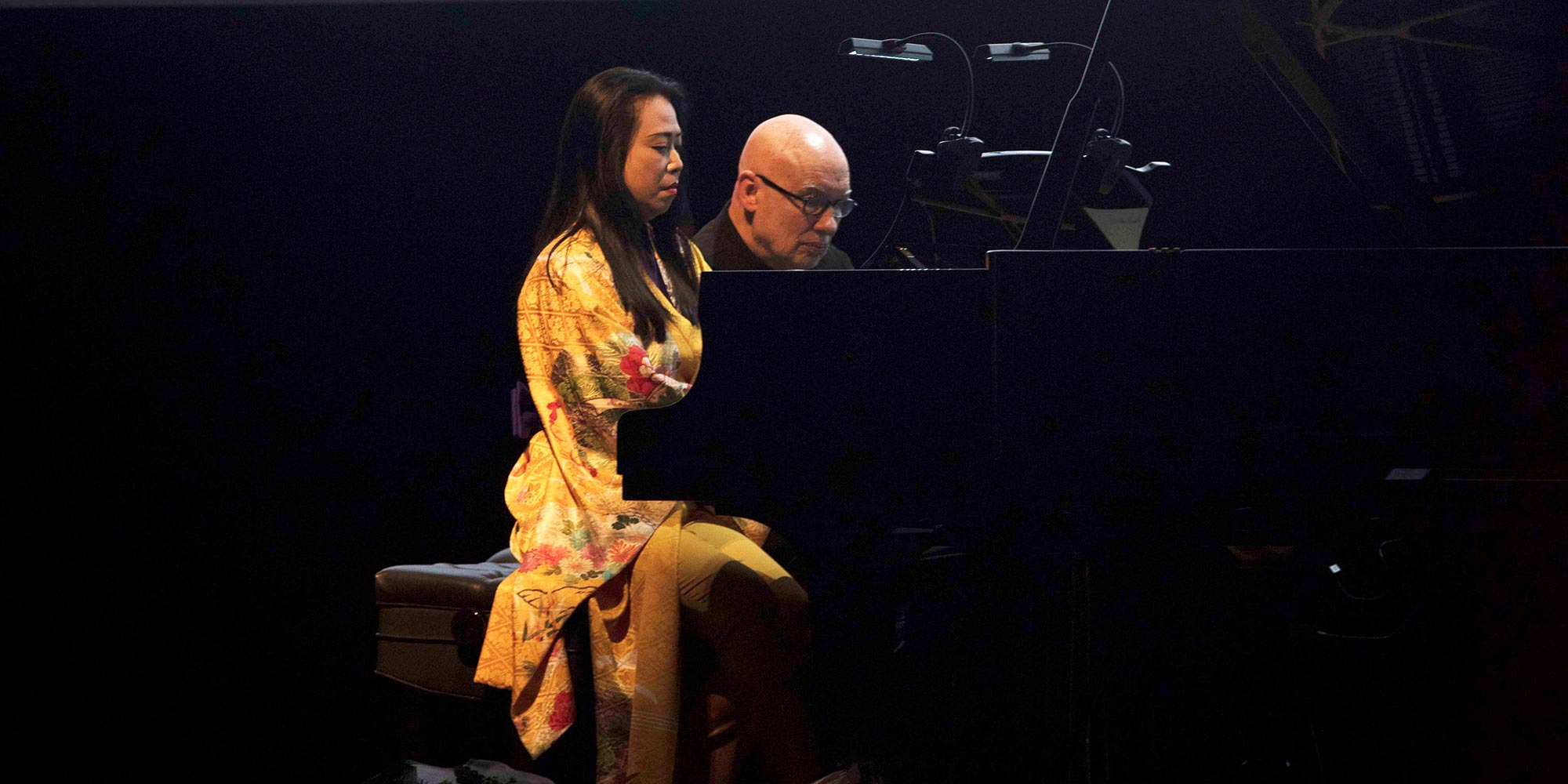The festival will conclude this year with another collaboration of the two pianists Maki Namekawa and Dennis Russell Davies with the digital visual artist Cori O’lan. It is part of a multi-year Ars Electronica project dedicated to the visual interpretation of musical expression and perception as well as the direct encounter between analog sound and digital visuals.
The evening’s music program includes a “classic” and a premiere. L’Oiseau de feu (The Firebird) by Igor Stravinsky is a reference piece in music history and Dennis Russell Davies has arranged it for piano four-hands. The second part is the Austrian premiere of the first piano sonata by Philip Glass, which he dedicated to Maki Namekawa. Composed 110 years after The Firebird, the piano sonata is a joint commission of Piano-Festival Ruhr, Philharmonie de Paris, and Ars Electronica. Its world premiere performance took place in July 2019 at the Piano-Festival Ruhr and both the composer as well as Maki Namekawa received enthusiastic appreciation.
Program
Igor Stravinsky / arr. for Piano 4 hands Dennis Russell Davies “Firebird” (Austrian Premier)
PianoDuo: Maki Namekawa & Dennis Russell Davies
digital realtime visualisation: Cori O’lan
– intermission –
Philip Glass: Piano Sonata (Austrian Premier)
Movement I
Movement II
Movement III
Piano: Maki Namekawa
digital realtime visualisation: Cori O’lan
Commissioned by :
the Piano-Festival Ruhr, the Ars Electronica and the Philharmonie de Paris
About the music:
L’Oiseau de feu (Der Feuervogel), Igor Stravinsky, 1910
Arrangement for piano four hands: Dennis Russell Davies
In 1909, when Igor Stravinsky began to work on the music for the ballet The Firebird, which Sergei Diaghilev had commissioned for his Ballets Russes, he was still a young and little-known composer. The premiere of The Firebird in Paris in 1910, which was equally celebrated by audiences and critics, suddenly made the 27-year-old Igor Stravinsky internationally famous.
With his complex rhythms and extraordinary tonal effects of the great orchestra, Stravinsky created a surprising and gripping characterization of the mystical story of Ivan Zarevich, who defeats the evil sorcerer Kaschej and his demons with the help of the firebird.
Dennis Russell Davies built his arrangement for piano four-hands on Stravinsky’s piano score and it is amazing how varied and sensitive he succeeds in transferring the effect of the overwhelming, colorful richness of the orchestral sounds into the fragility of the piano sound. Reduced to the elementary sound, it opens up a persuasive path to the essence of Stravinsky’s great composition.
Piano Sonate No. 1, Philip Glass, 2019
“The Sonata is colorful, wild, excitingly jumpy…” – with these words Malte Hemmerich begins his review of the premiere of Philip Glass’s latest work at the Piano-Festival Ruhr on July 4th 2019 in the Frankfurter Allgemeine Zeitung.
He further continues “… it is a prime example of Philip Glass’s piano music with its opposing rhythms, and there are also many other familiar elements from the composer’s etudes and individual works. In such a wild kaleidoscope, however, they appear here for the first time.”
“It is Glass’s most demanding piano work to date; the rapid succession of virtuoso octave jumps are close to the limit of playability. Namekawa breathes this music, the piece is an example of how an incomparable unity can arise from the close collaboration between composer and interpreter.”
Credits:
- Piano Sonata by Philip Glass
- Commissioned by Piano-Festival Ruhr,
- Festival Ars Electronica, Philharmonie de Paris,
- World Premiere Performance July, 2019.
- Supported by Yamaha
About the artists:
Maki Namekawa is a leading figure among today’s pianists, bringing to audiences’ attention contemporary music by international composers. As a soloist and a chamber musician equally at home in classical and repertoire of our time, she performs regularly at international venues such as Suntory Hall Tokyo, Carnegie Hall and Lincoln Center New York, Davies Symphony Hall San Francisco, Barbican Center and Cadogan Hall London, Cité de la Musique Paris, Concertgebouw Amsterdam, Salzburg Festival, Ars Electronica Linz, Musik-Biennale Berlin, Eclat Festival Stuttgart, Rheingau Music Festival and Piano-Festival Ruhr.
Maki Namekawa records and performs frequently for major radio networks in Germany, the Netherlands, Switzerland and France. Orchestra engagements include Royal Concertgebouw Orkest Amsterdam, Münchner Philharmoniker, Bamberger Symphoniker, Dresdner Philharmonie, Bruckner Orchester Linz, American Composers Orchestra, and Seattle Symphony.
In 2013, she performed the world premiere of the entire cycle of Philip Glass’ 20 etudes for piano solo at Perth International Arts Festival under the participation of Glass himself, followed by concerts around the world in the US, Mexico, Brazil, Ireland, Scotland, Iceland, Sweden, Finland, Denmark, Slovakia, Poland, Germany and Japan. A double-CD of the complete Glass etudes has been released in 2014 by Orange Mountain Music, reaching number 1 of the iTunes Classic charts and receiving high praise in the categories “Performance” and “Recording” by BBC Music Magazine. In September 2017 Maki Namekawa presented the whole cycle of Glass etudes for the first time in Austria at Festival Ars Electronica.
Together with her husband, the conductor Dennis Russell Davies, Maki Namekawa formed a piano duo in 2003 which regularly performs in leading venues in Europe and North America including the Piano-Festival Ruhr, the Radialsystem in Berlin, the Salzburg Festival, the Ars Electronica Festival, the Lincoln Center Festival, the Morgan Library and “Roulette” in New York City, the Philips Collection in Washington, D.C., and the Other Minds Festival in California. Major works written for the Namekawa-Davies Duo include Philip Glass’ “Four Movements for Two Pianos”, “Chen Yi’s “China West Suite”, and Glass’ “Two Movements for Four Pianos“ (with Katia and Marielle Labèque) all commissioned by the Piano-Festival Ruhr. In July 2017, Maki Namekawa, Dennis Russell Davies and Philip Glass received the Piano-Festival Ruhr Award.
In September 2018, Maki Namekawa released the piano version of Philip Glass’ soundtrack “MISHIMA – A Life in Four Chapters” that depicts the life and death of the japanese writer and political activist Yukio Mishima. The arrangement was especially crafted for her by Glass’ longterm musical director Michael Riesman and features her crystal-clear technique. The recording was awarded the prestigious “Pasticcio Preis” by Austrian national radio.
In 2019 Philip Glass composed his first Piano Sonata especially for Maki Namekawa. She premiered the Sonata on July 4th, 2019 at Piano-Festival Ruhr in Germany in the presence of the composer.
Maki Namekawa studied piano at Kunitachi Conservatory in Tokyo with Mikio Ikezawa and Henriette Puig-Roget. In 1994 she won the Leonid Kreutzer Prize. In 1995 she continued her studies with Werner Genuit and Kaya Han at Musikhochschule Karlsruhe, where she completed her diploma as a soloist with special distinction. She went on to perfect her artistry in Classical-Romantic repertoire with Edith Picht-Axenfeld, in contemporary music with Pierre-Laurent Aimard at Musikhochschule Köln, György Kurtág, Stefan Litwin and Florent Boffard.
Dennis Russell Davies was born in Toledo (Ohio) and studied piano and conducting at the Juilliard School, New York. His activities as an opera and concert conductor, and as a pianist and chamber musician, are characterized by an extensive repertoire stretching from the Baroque to the latest music of our time. Widely considered to be one of the most innovative and adventurous conductors in the classical music world, Dennis Russell Davies has successfully challenged and inspired audiences on both sides of the Atlantic. He is noted for his exciting and well-structured concert programmes and for close working relationships with many composers, among them Luciano Berio, William Bolcom, John Cage, Manfred Trojahn, Philip Glass, Heinz Winbeck, Laurie Anderson, Philippe Manoury, Aaron Copland, Hans Werner Henze, Michael Nyman and Kurt Schwertsik.
After first appointments as Musical Director of the Saint Paul Chamber Orchestra 1972-1980 and Chief Conductor of the American Composers Orchestra in New York 1977-2002, Davies moved to Europe and settled down in Germany and Austria. He held positions as Music Director of the Staatsoper Stuttgart (1980-1987) as well as Chief Conductor of the Beethovenhalle Orchestra, Music Director of the Bonn Opera and the International Beethoven Festival (1987-1995). From 1997-2000 he was Chief Conductor of Radio Symphony Orchestra Vienna, was entrusted with a conducting professorship at the Salzburg Mozarteum in 1997 and was Chief Conductor of Stuttgart Chamber Orchestra from 1995-2006, with which he recorded all 107 Symphonies of Joseph Haydn for CD, only the third complete recording of this oeuvre. In addition, he became Chief Conductor of Basel Symphony Orchestra from 2009-2016, from 2002-2017 he was Opera Director at the Landestheater Linz as well as Chief Conductor of Bruckner Orchestra Linz where he got awarded the title “GMD”in 2014.
As a guest, Dennis Russell Davies has conducted such renowned orchestras as those in Cleveland, Philadelphia, Chicago, San Francisco, Boston and the New York Philharmonic, as well as Yomiuri Nippon Symphony.
In Europe, he has worked with Accademia di Santa Cecilia di Roma, Orchestra Filarmonica della Scala di Milano, Orquesta Nacional de España, Gewandhausorchester Leipzig, Dresdener Philharmonie, the Deutsche Symphonie-Orchester Berlin, the Munich and Berlin Philharmonic Orchestras, Bamberg Symphony Orchestra, the Concertgebouworkest Amsterdam and the St. Petersburg Philharmonic.
After his début at the Bayreuth Festival 1978-1980, his operatic work has included conducting at Lincoln Center Festival New York, Houston Grand Opera, Lyric Opera of Chicago, Metropolitan Opera New York, Opéra National de Paris, Teatro Reál de Madrid, Hamburg and the Bavarian State Operas, Salzburg Festival and Wiener Staatsoper.
During his tenure as GMD in Linz, the new Linz Opera House was inaugurated in April 2013, at which occasion Dennis Russell Davies conducted the world premiere of Philip Glass’s opera “The Lost” as well as Strauss’ ”Der Rosenkavalier”. In addition, he conducted new productions of the whole “Ring des Nibelungen”, “Pelléas et Mélisande”, “Falstaff”, “Salome”, the European premiere of “McTeague” as well as world premieres by Moritz Eggert and Michael Obst at the new “Musiktheater”.
Davies’ work also had a crucial and lasting effect on the concert sector of Bruckner Orchester Linz by reaching out to modernity and new audiences, and frequent touring activity while still working on their core repertoire, e.g. the recording of all symphonies of Bruckner in every version.
In September 2018, Dennis Russell Davies took up his position as Artistic director and Chief Conductor of Filharmonie Brno.
Dennis Russell Davies is a Fellow of the American Academy of Arts and Sciences. In December 2014, the title “Commandeur des Arts et Lettres” was bestowed on Dennis Russell Davies by the French government, in 2017, he received the “Österreichische Ehrenkreuz für Wissenschaft und Kunst 1. Klasse” by the Austrian government.
About the visuals:
As always in Cori O’Lan’s collaboration with Dennis Russel Davies and Maki Namekawa, the visualizations are pure real-time graphics, i.e. there are no prepared videos or image sequences that are synchronized to the music. It is only the sound of the piano directly picked up over two microphones, which is analyzed by computer and thus provides the parameters with which the graphics are generated, animated and modified – live in the moment of the performance.
The very dance-like animations of the graphic elements designed to correspond to The Firebird ballet and its characters are derived exclusively from the sound spectrum and dynamics of the music, without motion tracking or keyframe animation. The parameters derived from the music are directly assigned to various parameters of physics-based simulation models, particle systems as well as to the geometries, colors and lights.
The storyline of the ballet:
The young Prince Ivan chases the firebird and enters the magician’s garden. At the wonder tree he catches the bird, which asks for its freedom. When the prince grants it this freedom, he receives a feather which has magical powers and which summons the firebird in case of danger.
Thirteen virgins, held captive by the sorcerer Kaschej, come into the garden and dance around the tree. Among them is Princess Zarevna, with whom Ivan falls in love immortally.
Threatening signals announce the appearance of Kaschej and his demons. They harass Ivan Zarevich and want to kill him. At his moment of greatest need, he calls the firebird with the feather. The firebird appears and forces Kaschej and the demons to dance with magical music and then sings them into a deep sleep.
The Firebird reveals to Ivan a cave under the roots of the miracle tree, it is the hiding place of a giant egg in which Kaschej keeps his soul. The prince smashes the egg, the magician’s power disappears and he dies. His captured victims are now freed and Princess Zarevna and Ivan Zarevich are united.





